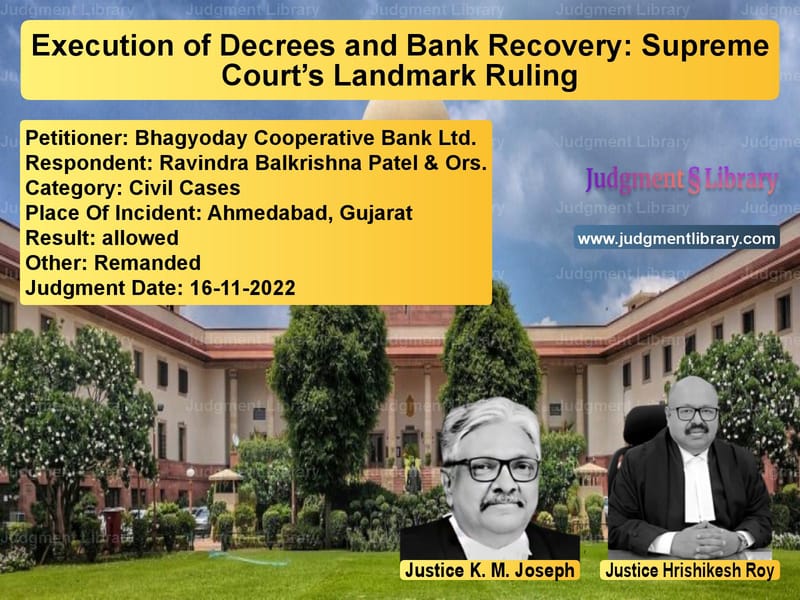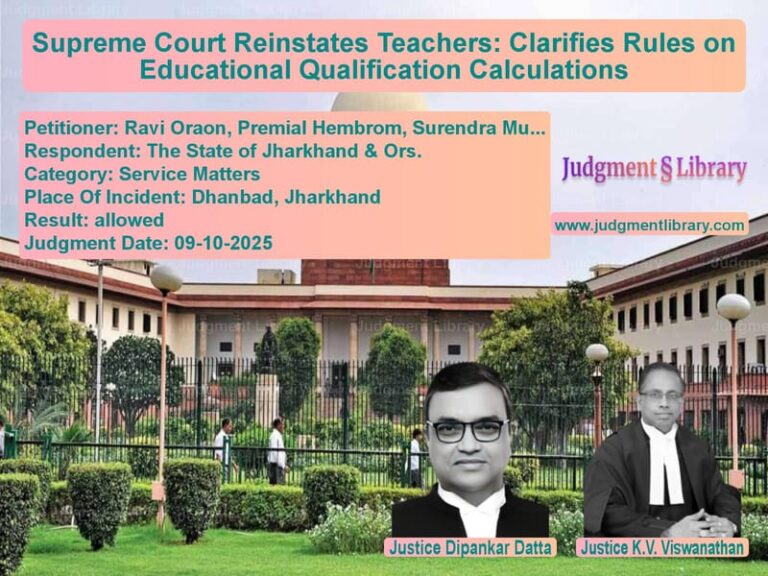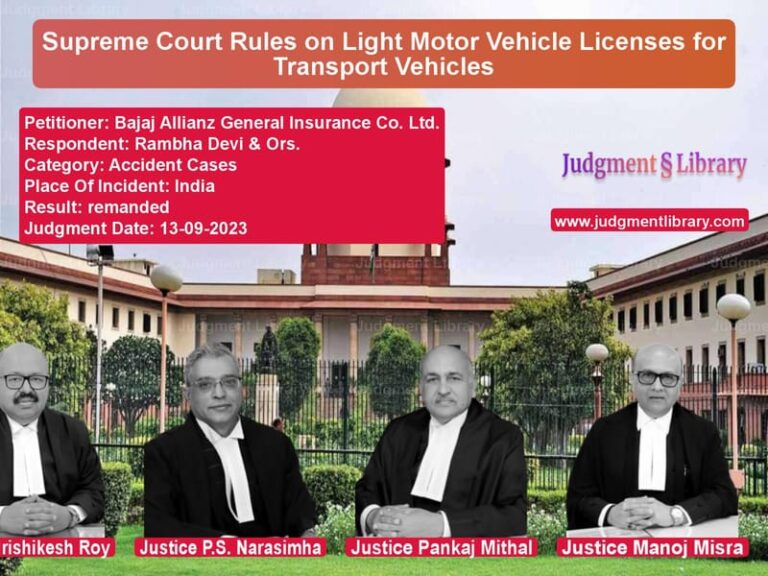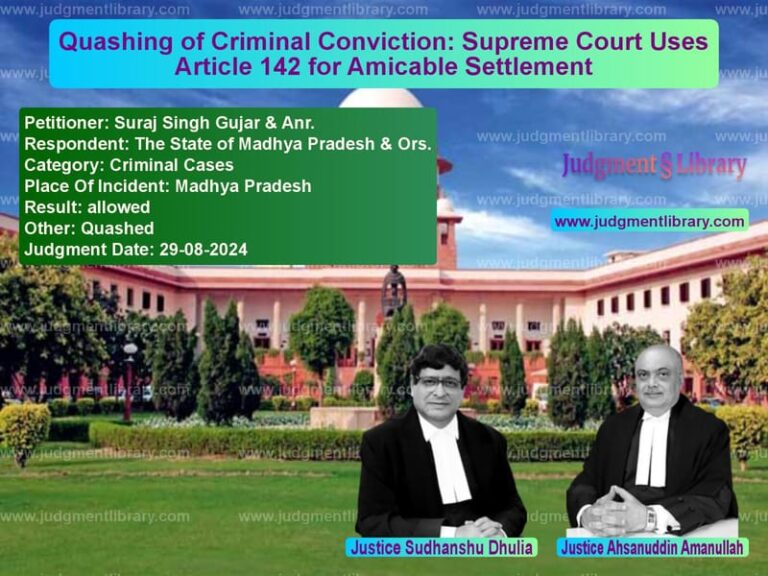Execution of Decrees and Bank Recovery: Supreme Court’s Landmark Ruling
The Supreme Court of India recently delivered a crucial judgment in the case of Bhagyoday Cooperative Bank Ltd. v. Ravindra Balkrishna Patel & Ors., which addressed the complexities involved in the execution of decrees, particularly in cooperative banking disputes. The Court examined whether a decree-holder could pursue fresh execution proceedings after an earlier execution petition was dismissed due to procedural lapses.
Background of the Case
The appellant, Bhagyoday Cooperative Bank Ltd., had granted financial assistance to a firm named M/s Vimal Traders, whose partners were Ravindra Balkrishna Patel and Nikhil Balkrishna Patel. When the firm defaulted on the repayment, the bank initiated legal proceedings under the Gujarat Cooperative Societies Act, 1961. The Board of Nominees ruled in favor of the bank, awarding a decree of Rs. 2,61,314.34 with interest.
The bank attempted to execute this decree but faced multiple hurdles:
- The execution application was initially filed before the City Civil Court, Ahmedabad, in 1995 but was dismissed in 1997 due to non-service of notice.
- In 2006, a fresh execution petition was filed before the 4th Additional Senior Civil Judge, Ahmedabad Rural.
- The Patel brothers objected, arguing that the second execution petition was not maintainable due to the dismissal of the first one.
- The bank sought satisfaction of its decree from the funds deposited in another execution case involving the judgment-debtors’ deceased mother, who had stood as a guarantor.
Petitioner’s Arguments
The appellant bank contended that:
- The first execution petition was dismissed due to procedural difficulties, not on merits, and a fresh execution petition was permissible under law.
- The Gujarat Cooperative Societies Act, 1961, treats certain arbitration awards as decrees of a civil court, making them enforceable under the Code of Civil Procedure (CPC).
- The second execution petition was within the 12-year limitation period specified under Section 103 of the Act.
- The money realized from the court auction in another case involving the judgment-debtors’ mother should be used to satisfy the bank’s decree.
Respondent’s Arguments
The respondents (Patel brothers) opposed the execution petition on the following grounds:
- The second execution petition was barred due to the earlier petition’s dismissal.
- Execution proceedings must comply with Sections 38 and 39 of CPC, which require proper transfer procedures before another court can execute the decree.
- The garnishee order sought by the bank under Order 21 Rule 46A of CPC was illegal as no prior attachment of the debt had been made.
- The bank was seeking to attach funds belonging to legal heirs without due process.
Supreme Court’s Observations
The Court addressed three key issues:
- Maintainability of a fresh execution petition: The Court reaffirmed that an execution petition dismissed for default does not bar a fresh petition as long as it is within the limitation period.
- Applicability of Sections 38 and 39 of CPC: Since the original decree was based on an arbitration award under the Cooperative Societies Act, it did not require a formal transfer order for execution in another jurisdiction.
- Validity of the garnishee order: The Court held that Order 21 Rule 46A was incorrectly applied as the funds in question had not been properly attached before issuing a garnishee notice.
Supreme Court’s Verdict
The Supreme Court ruled in favor of the bank, holding that:
- The second execution petition was valid as it was filed within the limitation period.
- The High Court erred in applying Sections 38 and 39 of CPC to the case.
- Although the garnishee order was improperly issued, the bank was entitled to recover its dues from the deposited funds through proper legal procedures.
The Court directed the Execution Court to proceed with the recovery process under Order 21 Rule 52 of CPC, ensuring compliance with due process while enabling the bank to realize its decree.
Key Takeaways from the Judgment
This ruling provides clarity on multiple aspects of execution law:
- Fresh Execution Petitions: Dismissal of an earlier execution petition for procedural reasons does not preclude a fresh attempt if filed within the statutory period.
- Execution of Arbitration Awards: Awards deemed as civil court decrees under cooperative laws do not require transfer orders under Sections 38 and 39 of CPC.
- Proper Attachment Procedures: Garnishee orders must follow the correct procedural steps, including prior attachment, to be valid.
Conclusion
The Supreme Court’s decision in Bhagyoday Cooperative Bank Ltd. v. Ravindra Balkrishna Patel & Ors. reinforces the rights of decree-holders while upholding due process in execution proceedings. By balancing procedural requirements with equitable relief, the ruling ensures that financial institutions can recover dues efficiently without procedural roadblocks.
Petitioner Name: Bhagyoday Cooperative Bank Ltd..Respondent Name: Ravindra Balkrishna Patel & Ors..Judgment By: Justice K. M. Joseph, Justice Hrishikesh Roy.Place Of Incident: Ahmedabad, Gujarat.Judgment Date: 16-11-2022.
Don’t miss out on the full details! Download the complete judgment in PDF format below and gain valuable insights instantly!
Download Judgment: bhagyoday-cooperativ-vs-ravindra-balkrishna-supreme-court-of-india-judgment-dated-16-11-2022.pdf
Directly Download Judgment: Directly download this Judgment
See all petitions in Contract Disputes
See all petitions in Debt Recovery
See all petitions in Damages and Compensation
See all petitions in Specific Performance
See all petitions in Judgment by K.M. Joseph
See all petitions in Judgment by Hrishikesh Roy
See all petitions in allowed
See all petitions in Remanded
See all petitions in supreme court of India judgments November 2022
See all petitions in 2022 judgments
See all posts in Civil Cases Category
See all allowed petitions in Civil Cases Category
See all Dismissed petitions in Civil Cases Category
See all partially allowed petitions in Civil Cases Category







